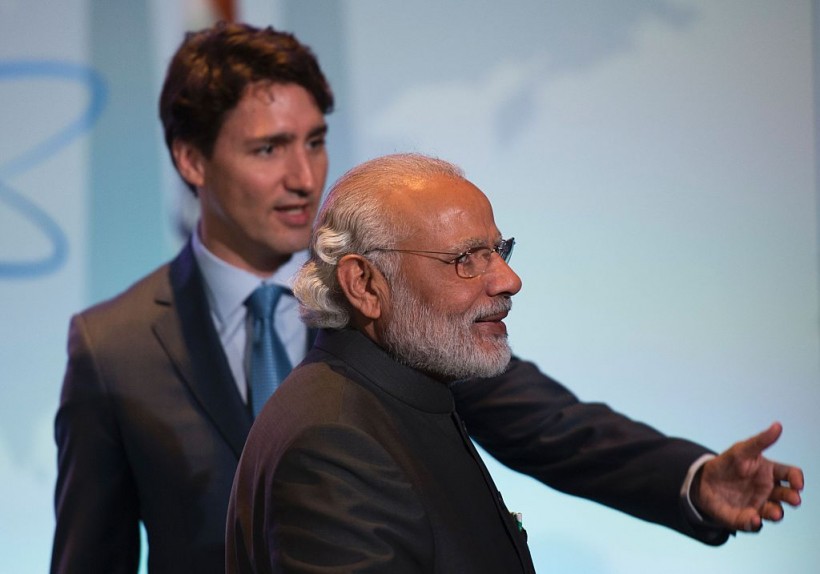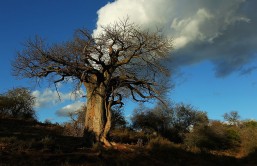
(Photo : ANDREW CABALLERO-REYNOLDS/AFP via Getty Images)
Canadian Prime Minister Justin Trudeau (L) introduces Indian Prime Minister Narendra Modi to his staff at a bilateral meeting during the 2016 Nuclear Security Summit in Washington, DC, April 1, 2016. / AFP / Andrew Caballero-Reynolds
In an escalation of the crisis that began when Prime Minister Justin Trudeau alleged that New Delhi may have been involved in the murder of a Canadian Sikh, India has demanded that Canada withdraw diplomats from the country.
New Delhi has instructed Ottawa to repatriate roughly 40 diplomats by October 10, according to individuals familiar with the demand. According to one source, India has threatened to revoke the diplomatic immunity of diplomats who remain in the country after that date.
India Tells Canada to Withdraw 41 Diplomats
The foreign ministries of Canada and India both declined to comment. New Delhi has previously stated its desire for "parity" in the number and rank of diplomats posted by each nation to the other.
Per Financial Times, Canada has several dozen more diplomats at its high commission in New Delhi than India does at its embassy in Ottawa due to the large consular section required to serve the relatives of the approximately 1.3 million Canadians who claim Indian ancestry.
According to one source, Canada had 62 diplomats in India, but New Delhi instructed them to reduce that number to 41.
The day after Trudeau's stunning statement, September 18, New Delhi had already announced a visa ban for Canadians.
The latest move threatens to significantly escalate the crisis that erupted when Prime Minister Justin Trudeau stated that the Canadian government was investigating "credible allegations" that Indian agents were responsible for the June murder of Canadian Sikh separatist Hardeep Singh Nijjar in a Vancouver suburb.
It will also complicate matters for Trudeau, who is under domestic pressure to act while also attempting to secure the support of western allies keen to cultivate relations with New Delhi as a buffer against China.
Peter Boehm, chair of the Canadian Senate committee on foreign affairs and international trade, stated, "Declaring more Canadian diplomats personae non gratae would not help the situation and would make it harder to reduce the emotions associated with this disagreement."
Ottawa was frustrated that weeks of covert diplomacy with India had failed to secure India's cooperation with the police investigation into the assassination of Nijjar.
The diplomacy included two visits to India by Canadian national security adviser Jody Thomas to discuss the issue prior to the September G20 summit in New Delhi. According to individuals familiar with the meetings, India did not acknowledge involvement in the murder but did not deny the claim. The Indian government stated that the allegations were false.
The assassination was also the subject of Trudeau's G20 meeting with India's prime minister Narendra Modi, during which the Indian side categorically rejected a request for cooperation. According to those familiar with the matter, India had even urged Canada to suspend the investigation in earlier meetings.
Read Also: Canada PM Justin Trudeau Denies Claims He Went to G20 Summit in Plane Full of Cocaine
Khalistani Separatist's Death
Last week in Washington, India's foreign minister S Jaishankar stated that the alleged assassination was "not consistent with our policy" and accused Canada of tolerating Sikh separatists advocating for an independent Indian state.
According to Canadian media, Ottawa has intercepted communications involving Indian diplomats that indicate official involvement in the murder of Nijjar last June. India has denied having seen any such proof. Ottawa is limited in what it can share with the Indian government, in part to safeguard the sources and methods used to collect intelligence, but also to avoid jeopardizing the murder investigation, said the individuals with knowledge of the situation.
Thomas and other officials who visited India, including the chief of the Canadian Security Intelligence Service, David Vigneault, were only able to present the evidence orally to their Indian counterparts due to the constraints.
The standoff with India is a problem for Prime Minister Trudeau, whose popularity is waning in the midst of a cost-of-living crisis, while his Liberal party prepares for upcoming elections before October 2025. Critics have accused Trudeau of pandering to Canada's substantial Sikh population and acting precipitously.
It was "not a great time" for the crisis, according to a source familiar with his thinking. However, Trudeau felt impelled to make a statement in parliament due to the gravity of the allegations and a forthcoming article in The Globe and Mail, according to sources familiar with the matter.
Foreign policy expert at the University of Ottawa, Roland Paris, stated that the nature of the allegations left Trudeau with few options.
Canada is home to about 770,000 Sikhs, the highest population outside the northern Indian state of Punjab, and the Indian government has for decades expressed its displeasure with some community members' outspoken support for Khalistan, as per Aljazeera.
There are 15 Sikh members in the Canadian House of Commons, which is more than 4 percent of the seats, despite the fact that Sikhs make up less than 2 percent of the population.
During the 1980s and 1990s, India crushed an insurrection for a "Sikh homeland" of Khalistan that killed tens of thousands. Today, it has almost no support in Punjab. India accused Nijjar of "hateful speeches" and "seditionary and insurrectionary imputations" and designated him as "involved in terrorism" in 2020.
Related Article: US, Indian Officials Meet for State Talks Amid Dispute with Canada Over Sikh Killing









